by Stefanie | Jun 26, 2016
I feel like I’ve expressed this sentiment so many times that anyone reading is like, “WE GET IT ALREADY,” but medical school passes by so quickly that it seems to defy the laws of physics. …Not that I remember much about the laws of physics. Not only have I officially started my core clinical rotations, but I’m already practically done with my first: Internal Medicine (which, coincidentally, is also the longest). I’ve spent time at the Ann Arbor VA, General Medicine at the University Hospital, and I’m currently on the Hematology/Oncology service also at the U. The majority of my experience thus far has been overwhelmingly positive. I have, however, never felt more stupid in my entire life (and have frequently expressed this out loud and received confirmation of the same from my classmates).
The transition from the classroom to the clinical realm is NUTS. For all the fuss I made over Step 1, it’s like the vast amounts of information I crammed into my head in preparation have magically disappeared now that it’s time to start actually utilizing it (thanks a lot, brain; you traitor).

She knows what she did.
There’s also all this other stuff that suddenly comes into play that lectures/Step 1 didn’t even touch. I have to know which antibiotics are oral and which are IV only? You do realize it’s a minor miracle when I even remember that they’re antibiotics, right? I’m continuously bewildered by the sheer quantity of knowledge that my superiors possess. I’ve not yet decided if they’re robots or wizards, but I’m pretty sure it’s one of the two. I’ll get back to you.
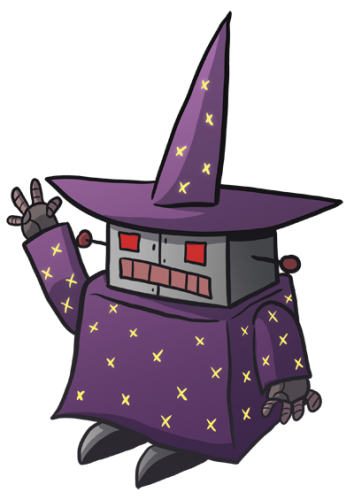
OR MAYBE BOTH! Tricksy hobbitses…
Probably the hardest part of figuring out how to navigate my new life (and it really does feel like an entirely new life) is balancing the fact that I am constantly findings topics that I need to study and have practically no time to study. I’ve heard that Internal Med is pretty hardcore in this regard and am hopeful that this balance will be easier to strike in the future.
My current feelings expressed above are highly colored by the fact that my end-of-rotation Shelf Exam draws ever closer. I must say that on most days during the past several weeks I’ve called my mom in the evening and essentially said, “I’m really happy and I don’t even know why.” Being part of a healthcare team, participating actively in patient care, learning by doing; it’s all permeated by a general sense of contentment. I just feel good (and exhausted, but that’s a given) at the end of the day more times than not. Honestly, one of my biggest fears at the moment is that I’m going to love everything and be an absolute hot mess when it comes time to decide what specialty I want to pursue. There are worse problems to have.
by Kate | Jun 24, 2016
It’s summer for the new M2s!! Actually, this is old news. We took our last exam on May 15th and so we have enjoyed almost six weeks of break. Since we start class again on August 1st, we are almost exactly at the halfway point of our summer. Time is flying by, so I’m not going to think about that; instead I’ll focus on how wonderful these past 6 weeks have been.
A few days after the end of term I headed northeast…really northeast…all the way to Iceland! I traveled around the island hiking above fjords, ogling beautiful glacial waterfalls, waving at sheep, camping under the midnight sun, and forgetting that I was a medical student.
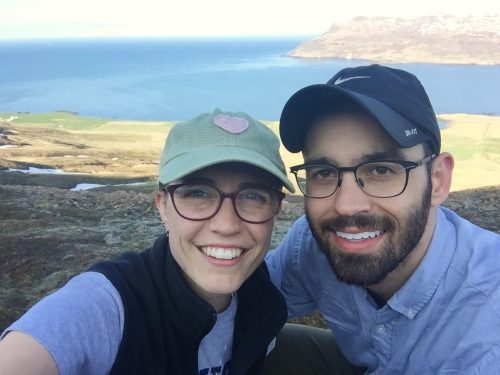
Hiking in Iceland! (Wearing my Michigan Med shirt, of course.)
I needed the break. I came back ready to get to work on my task for the summer: my SBRP project. The Student Biomedical Research Program (SBRP) is organized by the medical school, and provides a stipend for 10 weeks of research that medical students complete in partnership with a faculty member. I am working with Dr. Maggie Riley, a family medicine physician here at UM, to analyze the effectiveness of a program called MiHealth. MiHealth was designed by two M2s last year, and was piloted this spring. In the program, groups of medical students teach a series of health lessons in high school health classes, covering Smoking & Drugs, Mental Health & Depression, Healthy Relationships, Sexual Health, Nutrition, and Fitness & Exercise. The goals were to increase high school students’ health knowledge and reduce their risk behaviors, and to create a program that everyone involved (high school students and medical students) valuable. We gave everyone involved pre- and post-surveys to measure these metrics. I helped teach some of the lessons, and I certainly thought the program was valuable! It was great to get out into the community and interact with the high schoolers. By the time I finish my SBRP project we’ll know if the others involved agree with me. Stay tuned!
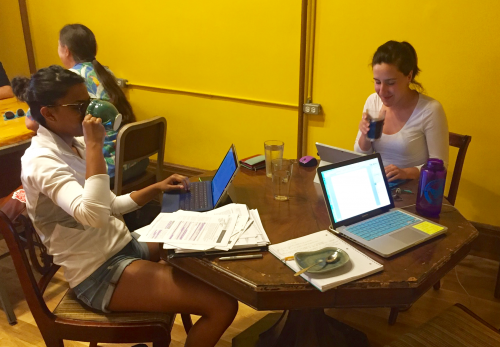
M2s working on research in a coffee shop.
My summer days have developed a rhythm: wake up early and go running, make breakfast and pack a lunch, walk downtown to work for a few hours in a coffee shop, change to a different coffee shop or the library after lunch and work some more, head home to relax or hang out with friends. After a year of keeping my nose to the grindstone for school, even working full time on a research project feels like a break. Having time to hang out with classmates without having to study at the same time feels particularly novel and fun. We’re working hard at completing the “summer in Ann Arbor bucket list,” which includes things like going to free concerts at the Summer Festival, tubing down the river, trying new restaurants during Restaurant Week, drinking sangria at Dominick’s, watching Shakespeare in the Arb, and walking the streets during the Ann Arbor Art Fair.
I’ve had time to read as well, which is great! My favorite book for this summer so far has been The Ghost Map, by Steven Johnson. It tells the story of the 1854 London cholera outbreak that, through a groundbreaking epidemiological study, resulted in the discovery that water coming from the Broad Street pump was the source of the bacteria, advancing public health, epidemiology, and bacteriology. Johnson writes a great narrative and incorporates aspects of sociology and urban history as well. I definitely recommend it.
A parting word of advice, if you are attending medical school in the fall, relax and soak up as much sun as you can now! I know I am.
by Joy | May 18, 2016
If I were to draw the interconnections between the patient, the health providers, insurers, and relevant stakeholders, the diagram would likely be crowded with lines everywhere. I am tempted to simplify the relationships when explaining my experiences with ICE (Initial Clinical Experience) to friends and family outside of the medical community. But have discovered that it is difficult to do so. In reality, patient care is truly all that complex.

When I think of operational management and quality improvement, the areas of possible near misses and unexpected deviation are so numerous that it is hard to imagine where to begin. After all, with so many people, how does communication flow to ensure the best quality care?
As I sit on a stool in the staff clinic space, the dietician announces without logging into MiChart, “let’s go see the next patient”. Puzzled I ask her how she knows. She explains that she sees the patient whenever there is a gap in the patient’s schedule. This could be after or before the physician has seen them, before or after the social work visit or pulmonary function testing. There is no exact place to check the timing, so she pops into the patient rooms to see if they are currently available. With no exact schedule in place for nutrition and social work visits, it seems as though seeing patients may be messy. “Sure”, she admits, “sometimes we do miss seeing patients.” But for the most part, surprising enough, it appears to work for them. It does however require lots of communication between the physicians, social workers, and dietician.
 In today’s world of increasingly complex medical care and specialization of roles, the importance of communication between all parties cannot be understated. Patient disgruntlement with clinic experiences is often a result or at the very least exacerbated by communication mishaps that can occur at any point in the clinic visit. At one visit, I watched a visibly distraught patient argue with the front desk clerk. The patient had checked in nearly an hour ago but had been waiting for her visit for a while and became increasingly upset as time went by. Unsurprisingly, it was an error in communication. The clerk had thought that the patient was going to get her labs done on another floor first before the clinic visit. This was not true. It was an unintentional mistake, but no doubt resulted in ill feelings towards the health system. In other instances, patient paperwork such as request for lab copies or documentation would occasionally become lost or not get to the appropriate channels. These are clearly system issues, but perhaps more difficult to fix because the large number of different healthcare provider roles.
In today’s world of increasingly complex medical care and specialization of roles, the importance of communication between all parties cannot be understated. Patient disgruntlement with clinic experiences is often a result or at the very least exacerbated by communication mishaps that can occur at any point in the clinic visit. At one visit, I watched a visibly distraught patient argue with the front desk clerk. The patient had checked in nearly an hour ago but had been waiting for her visit for a while and became increasingly upset as time went by. Unsurprisingly, it was an error in communication. The clerk had thought that the patient was going to get her labs done on another floor first before the clinic visit. This was not true. It was an unintentional mistake, but no doubt resulted in ill feelings towards the health system. In other instances, patient paperwork such as request for lab copies or documentation would occasionally become lost or not get to the appropriate channels. These are clearly system issues, but perhaps more difficult to fix because the large number of different healthcare provider roles. 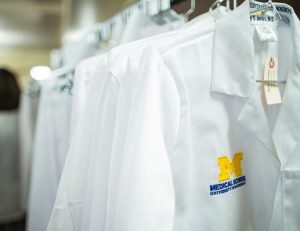
The delineation of roles can be difficult to see at times. At the pulmonary clinic, the nurse and medical assistants would take turns or occasionally help fill out insurance or prior authorization paperwork along with the nurse assist. The large number of contact points can also be confusing for patients. In one particular instance, despite introducing ourselves, a patient began explaining all his medical problems in great detail for nearly 10 minutes before thinking to ask, “Who are you again?” For patients with chronic conditions, navigating the healthcare may become eventually easier. Yet for newcomers or those previously in good health, determining the roles of all the different healthcare providers (other than the physician) and available resources can be a huge barrier to receiving excellent care. Increasing communication between all stakeholders is only all too important for making this transition easier.
At the end of each clinic visit, I like to ask the healthcare provider what he or she would like for us to know or take away from the experience as future physicians. The nurse I shadow says immediately and unequivocally, “communication is so important – it is so critical for making a strong team, good working environment, and better patient care.” I think she is right.
by Joy | May 17, 2016

UM Student Run Free Clinic Leadership Team
Just recently, as a clinic team, we were writing handwritten thank you cards to all our donors of the free clinic (running a free clinic is quite expensive even with completely volunteer labor!). While admittedly the cards were somewhat of a “thank-you-for-donating-please-donate again”, it was also truly a great way to thank donors and think back to how much it’s impacted my medical school experience. So here are some things about what makes the free clinic so great + what I’ve learned over the year:
- Running a clinic efficiently and on time is incredibly difficult. When talking with a patient, time seems to go by so quickly and it can be hard to keep appointments to the times allotted.
- It takes a lot of time (or people in the case of medical students) to keep a clinic running. Our leadership team has 17 people on it! When I had initially heard the number of people on the leadership team, I had to wonder, was there really enough work for 17 people to do? Surprisingly – the answer is yes. We’ve even considered adding additional leadership positions to handle the workload. Even now I do not know all the details of each position – but I do know that there is a lot that goes on behind the scenes.
- There’s also a fair bit of random things to operating a clinic that I had never even considered before to running a clinic too. Soap, blood pressure cuffs, custom-made appointment cards, stool sample cups, hemoglobin A1C cartridges? I didn’t even know what of some of things were prior to ordering to them – it was surprising to me the number of medical things you can purchase online. Thank goodness for Amazon!
- While we certainly can do more now than at the beginning of the year, it is somewhat neat how much pre-clinical students can do even only months into medical school. UMSRFC has been great in offering early exposure – the system of pairing one clinical student with a pre-clinic student definitely helps.
- The hurdles to attaining care are extremely high for economically disadvantaged individuals.
I unconsciously tend to think of the medical experience from a physician’s point of view – whether an accurate diagnosis was given, were good doctoring skills utilized, whether the physician seemed empathetic. But in reality, a patient’s perspective is influenced by the healthcare system as a whole including how well and smoothly a clinic is run. Working as part of the UMSRFC has given me a new appreciation for how much goes on outside of the patient-doctor interaction. It truly takes a lot outside work from many people with diverse skill sets to provide high quality care.
by Joy | May 9, 2016
Last month, we were given the opportunity to sign up for the clinical reasoning elective (CRE). As part of the elective, we go as pairs to work with a faculty member for 2 shifts per month (3-4 hours per shift) in either Emergency Medicine or Internal Medicine. Initially, I had thought it would be similar to shadowing, but instead it is more like we get to practice being clinical students in a low-stakes environment.
This has been one of the most enjoyable medical school experiences thus far. Through the experience, I’ve been able to attempt differential diagnoses and see clinical presentations of diseases I’ve learned about. Somehow, it feels as though seeing actual cases of a disease makes what we’re learning so much more real. I think only medical students could be so excited to see someone with norovirus.
It has also exposed me to some of the more emotionally challenging situations in medicine as well. This included exploring the social history of a patient living with organ transplant and how the disease has impacted the relationship between her and her daughters as well as talking to a patient who was just diagnosed with advanced ovarian cancer. We learned how to assess whether a drug overdose was accidental or intentional.
There are also cases that are memorable because of their atypicality such as the case where an individual was bitten by a squirrel on campus. The patient was concerned about a possible rabies infection and came to the emergency department to have it assessed. No worries though! We had just recently learned in our sequence that one does not get rabies from squirrels, which I guess is a good thing given that it would be pretty hard to track down the particular squirrel to assess for rabies! Ann Arbor squirrels all look somewhat like this:

While we have only recently started the elective, I am excited to connect what we’ve learned in the past year with real patients and looking forward to the next few months!
by Angelica | May 8, 2016
Two posts from me in one week. Crazy, right? On this, the eve of my official entry onto the wards, I thought I would take a quick moment to reflect on the past year. I’ve experienced a lot and learned a lot, so I decided to share ten things that I learned this year. Once again, being succinct is not yet one of my specialties so hang in there during my rather long musings.
M2 year is worse than M1 year, but at the same time also so much better.
At first this statement doesn’t seem to make sense, but I promise it does. M2 year is worse than M1 year because the stakes are higher. Step 1 is at the end of the year, and some blocks only have an exam and no quizzes. I always felt like I had to be much more prepared pretty much all of the time this year. At the same time, the material was SO much more interesting than during M1 year. This year, we focused on abnormal systems, so we got to learn what happens when things in the body go very wrong. The material covered this year felt much more like what I imagined medical school would be like.
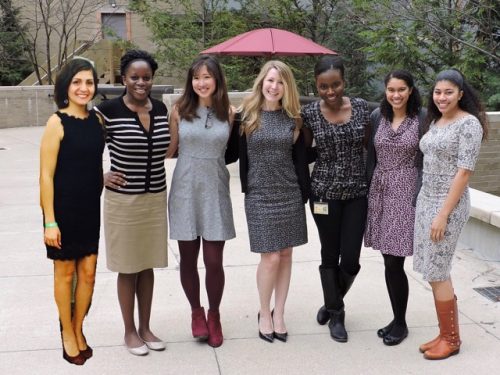
With a little help from technology, we made sure that no member of the Mottley Crew was left behind for our last day of M2 photo. I don’t know what I’d do without these lovely people.
Med student syndrome is a real thing.
I may or may not have self-diagnosed myself with a multitude of medical issues. I was mostly wrong, except for that one time I was right—that day, I was pretty proud of myself. In all seriousness, however, learning about tons of diseases with vague symptoms can get to you after a while, and more than one of my classmates has admitted to being more of a hypochondriac than when they entered med school. More often than not, our concerns are just us being neurotic, but if you’re really concerned about something, be sure to see your doctor.
Your study method is perfect until it isn’t.
Coming into M2 year, I thought that I had perfected my study method until I came to Neuro, when I quickly realized that my study method wasn’t cutting it. Instead of self-destructing like I would have last year, I changed what I was doing. It seems like a small and relatively obvious step, but if nothing else, medical students are creatures of habit. We study in the same places in the same way day after day. The simple fact that I had learned to adjust at some point over the past two years is an amazing step, and one that will be very helpful on the wards.
Step 1 is still scary, but what’s on the other side matters so much more.
Let’s be real: Step 1 is incredibly scary because it always feels like so much is riding on that 3-digit score. I think that it’s sometimes easy to forget that we haven’t spent the last two years exclusively preparing for Step. Instead, we have spent the last two years learning the basic science foundations of the diseases that our patients will have so that we can one day learn how to take care of them. Step 1 is merely the gateway that we must pass through in order to do so. When we forget that everything we do is actually about the patients, trouble arises. Some of my worst days during study period were those in which I forgot that everything I do and all of the sacrifices that I make are for my future patients. On my absolute worst Step 1 study day when I was in an awful mood and the absolute worst version of myself, I walked up to school and saw a patient going into the cancer center for chemo. It hit me hard and fast that there are real people suffering from real diseases out there, and in the grand scheme of everything, one exam didn’t mean that much. Here I was griping about this one-day exam that I had to take when there are people out there fighting for their lives. That encounter quickly put things into perspective and snapped me out of my awful mood. Patients are what we are here for and what this whole journey is all about.
Things still won’t always go as planned, and it’s still okay.
Sometimes life comes at you hard. People that we love pass away, relationships end, friendships hit rocky points, and sicknesses occur. Life doesn’t just stop because you’re in medical school. Sometimes, it’s important to take a step away from medicine to take care of life. Yes, this puts you behind on your study schedule, but sometimes, it’s more important to be present in your own life. I’m the absolute worst at this, but even I definitely had to take a couple deferrals this year due to illness. The most important thing at that point was that I was back to functioning and ready to go, even if it meant taking my exam 2 days late and being behind on the next block. We are still people, even if we want to be invincible, and it’s okay if something affects us now and then.
Some days are really hard.
Just as there were many good days this year, there were also days that seriously made me reconsider my decision to go into medicine. For example, in my clinical reasoning elective, I had a really troubling encounter with a patient. The health care system failed this patient in a big way, and I found this incredibly distressing. I always knew that the health care system isn’t perfect, and I had dealt with its over-arching fallout in public health. However, this was the first time that I truly realized that by entering the health care system, I was now a part of the problem and would be fighting this for the rest of my life. I am now part of a system that tries to do right by patients but can actually hurt them significantly in the process. It’s easy to talk about failures of the health care system, but it’s an entirely different situation to see how patients’ lives are impacted. It’s an encounter that has stuck with me, and I get the feeling that it will be one of those that I will never forget.
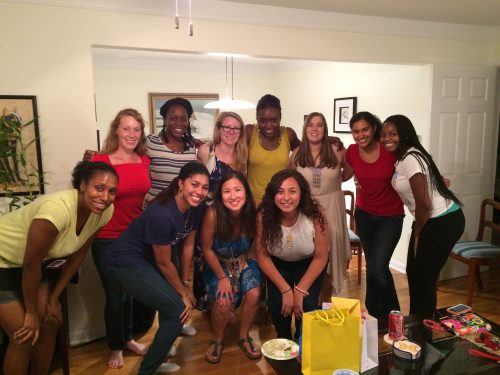
The ones who get me through the hard days
Find your role model.
One of the best parts of being at an amazing academic medical center is that there are role models everywhere. Every now and then, there is a physician who shows me exactly what I don’t want to be when I’m practicing (which is also useful), but for the most part, I’m surrounded by truly amazing physicians who genuinely care about their patients and are all-around fantastic humans. One such amazing physician was my clinical reasoning elective preceptor. She taught me so much about how the social determinants of health can impact patients’ lives in big ways, and her actions made it more than obvious that she cared about her patients and went above and beyond expectations for them. I want to be her when I grow up. The physicians who are our role models teach us about the art of medicine, which is something that can’t be taught in a classroom but is just as important as medical knowledge. In short, we all need people to look up to, and there is no better time to find a role model than when you’re surrounded by so many of them.
Take time for yourself.
Disclaimer: I am horrible at this. I have this really bad habit of hitting the gas pedal and neglecting the brakes until illness forces me to slow down. However, this year, I tried to do nice things for myself now and then. I tried to go for runs or to yoga, I made an effort to spend time with friends and family, and I bought myself some fancy loose-leaf tea to enjoy. Those seem like small things, but when life is otherwise ridiculously busy, the small things make all the difference. It’s important to find a couple things that keep you sane and make sure that they find their way into your schedule. The time away from studying doesn’t seem worth it sometimes, but I promise that it is.

Sometimes you just have to get away.
Lean on your people.
My support system is still the reason why I have made it this far. I don’t know what I’d do without my family, friends, and mentors. They’re the reason that I keep going on my worst days, and they’re always behind me in my best moments. I can’t imagine making this journey without them, and I am so grateful to have them in my life. I can’t thank them enough for all of the encouragement in the past year and for putting up with me on the days when I was at my absolute worst (I’m looking at you Step 1 study period).
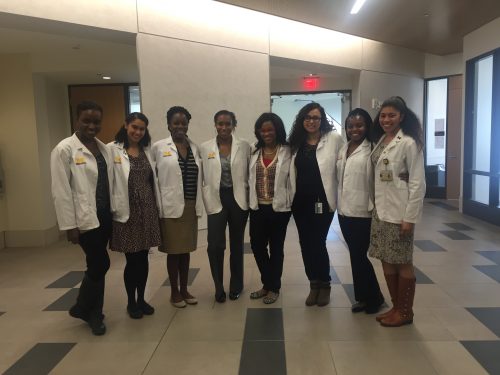
M2 BMA ladies celebrating the last day of classes
There is still truly nothing that I want to do more than medicine and public health.
This year, someone asked me if I would take the same pathway if I were given the choice again. I can stand here confidently and say yes. There are still days when I question the decision, but in all seriousness, I would absolutely do this again. The intersection of public health and medicine is where I am in my happy place, it’s my calling, it’s where I belong. I was talking with one of my friends who is about to start residency, and he mentioned how he can’t imagine having a job that was just a job. He’s right. Medicine isn’t for those who want a job where they can clock in and out at whatever time and leave everything behind. Medical school is a sacrifice, and the sacrifice certainly doesn’t end when you have M.D. behind your name. However, it is so worth it when you realize that lives can be absolutely changed because of the work you do. It’s a gift that comes with huge responsibility, but I really can’t imagine doing anything else, and I would do this a thousand times over.
Tomorrow, I will wake up, don my white coat, and head to my first day of clinic. While I’m glad to put M2 year behind me, I am also glad that I had the experiences I did. Hopefully, some of the lessons I’ve learned will help me on the wards, but I know that these lessons have also shaped the person I’ve become since starting medical school. Now, however, it’s time to begin a whole new set of experiences. I can’t wait to see what the next year brings.
As always, thanks for reading. Until next time, here’s to lessons learned and new beginnings.






 In today’s world of increasingly complex medical care and specialization of roles, the importance of communication between all parties cannot be understated. Patient disgruntlement with clinic experiences is often a result or at the very least exacerbated by communication mishaps that can occur at any point in the clinic visit. At one visit, I watched a visibly distraught patient argue with the front desk clerk. The patient had checked in nearly an hour ago but had been waiting for her visit for a while and became increasingly upset as time went by. Unsurprisingly, it was an error in communication. The clerk had thought that the patient was going to get her labs done on another floor first before the clinic visit. This was not true. It was an unintentional mistake, but no doubt resulted in ill feelings towards the health system. In other instances, patient paperwork such as request for lab copies or documentation would occasionally become lost or not get to the appropriate channels. These are clearly system issues, but perhaps more difficult to fix because the large number of different healthcare provider roles.
In today’s world of increasingly complex medical care and specialization of roles, the importance of communication between all parties cannot be understated. Patient disgruntlement with clinic experiences is often a result or at the very least exacerbated by communication mishaps that can occur at any point in the clinic visit. At one visit, I watched a visibly distraught patient argue with the front desk clerk. The patient had checked in nearly an hour ago but had been waiting for her visit for a while and became increasingly upset as time went by. Unsurprisingly, it was an error in communication. The clerk had thought that the patient was going to get her labs done on another floor first before the clinic visit. This was not true. It was an unintentional mistake, but no doubt resulted in ill feelings towards the health system. In other instances, patient paperwork such as request for lab copies or documentation would occasionally become lost or not get to the appropriate channels. These are clearly system issues, but perhaps more difficult to fix because the large number of different healthcare provider roles. 






